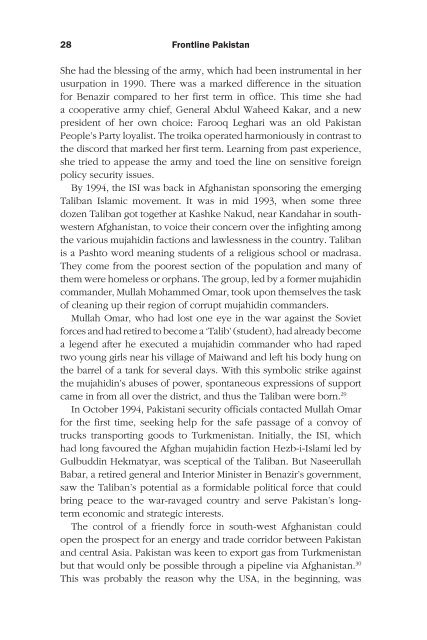Frontline Pakistan : The Struggle With Militant Islam - Arz-e-Pak
Frontline Pakistan : The Struggle With Militant Islam - Arz-e-Pak
Frontline Pakistan : The Struggle With Militant Islam - Arz-e-Pak
Create successful ePaper yourself
Turn your PDF publications into a flip-book with our unique Google optimized e-Paper software.
<strong>Frontline</strong> <strong><strong>Pak</strong>istan</strong><br />
She had the blessing of the army, which had been instrumental in her<br />
usurpation in 1990. <strong>The</strong>re was a marked difference in the situation<br />
for Benazir compared to her first term in office. This time she had<br />
a cooperative army chief, General Abdul Waheed Kakar, and a new<br />
president of her own choice: Farooq Leghari was an old <strong><strong>Pak</strong>istan</strong><br />
People’s Party loyalist. <strong>The</strong> troika operated harmoniously in contrast to<br />
the discord that marked her first term. Learning from past experience,<br />
she tried to appease the army and toed the line on sensitive foreign<br />
policy security issues.<br />
By 1994, the ISI was back in Afghanistan sponsoring the emerging<br />
Taliban <strong>Islam</strong>ic movement. It was in mid 1993, when some three<br />
dozen Taliban got together at Kashke Nakud, near Kandahar in southwestern<br />
Afghanistan, to voice their concern over the infighting among<br />
the various mujahidin factions and lawlessness in the country. Taliban<br />
is a Pashto word meaning students of a religious school or madrasa.<br />
<strong>The</strong>y come from the poorest section of the population and many of<br />
them were homeless or orphans. <strong>The</strong> group, led by a former mujahidin<br />
commander, Mullah Mohammed Omar, took upon themselves the task<br />
of cleaning up their region of corrupt mujahidin commanders.<br />
Mullah Omar, who had lost one eye in the war against the Soviet<br />
forces and had retired to become a ‘Talib’ (student), had already become<br />
a legend after he executed a mujahidin commander who had raped<br />
two young girls near his village of Maiwand and left his body hung on<br />
the barrel of a tank for several days. <strong>With</strong> this symbolic strike against<br />
the mujahidin’s abuses of power, spontaneous expressions of support<br />
came in from all over the district, and thus the Taliban were born. 29<br />
In October 1994, <strong><strong>Pak</strong>istan</strong>i security officials contacted Mullah Omar<br />
for the first time, seeking help for the safe passage of a convoy of<br />
trucks transporting goods to Turkmenistan. Initially, the ISI, which<br />
had long favoured the Afghan mujahidin faction Hezb-i-<strong>Islam</strong>i led by<br />
Gulbuddin Hekmatyar, was sceptical of the Taliban. But Naseerullah<br />
Babar, a retired general and Interior Minister in Benazir’s government,<br />
saw the Taliban’s potential as a formidable political force that could<br />
bring peace to the war-ravaged country and serve <strong><strong>Pak</strong>istan</strong>’s longterm<br />
economic and strategic interests.<br />
<strong>The</strong> control of a friendly force in south-west Afghanistan could<br />
open the prospect for an energy and trade corridor between <strong><strong>Pak</strong>istan</strong><br />
and central Asia. <strong><strong>Pak</strong>istan</strong> was keen to export gas from Turkmenistan<br />
but that would only be possible through a pipeline via Afghanistan. 30<br />
This was probably the reason why the USA, in the beginning, was













